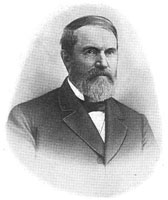A Rebellion of Giants: Dixon, Ryan, and Taming the Railroads in the Gilded Age

Luther S. Dixon
This is the fifth in a series of Schoone Fellowship Field Notes.
Eastern jurists such as John Marshall, James Kent, Oliver Wendell Holmes, and Benjamin Cardozo have received the lion’s share of attention from law professors and historians over the years. Two fellow giants from the Midwest, Michigan’s Thomas Cooley and Iowa’s John Dillon, have been relegated to comparative obscurity.
Cooley and Dillon played a central role in shaping the contours of modern American constitutional law. They forged their philosophies in the heat of two critical judicial debates over the role of railroads in American society. Two Wisconsin justices, Luther Dixon and Edward Ryan, were also leaders in those debates, and their contributions to American constitutional law deserve to be better known.
